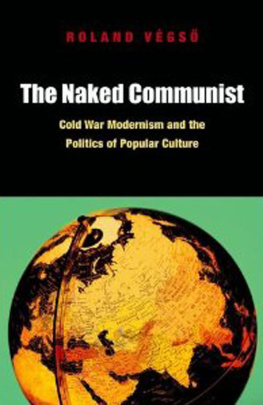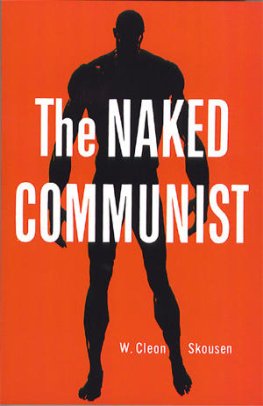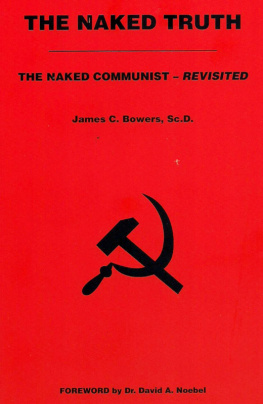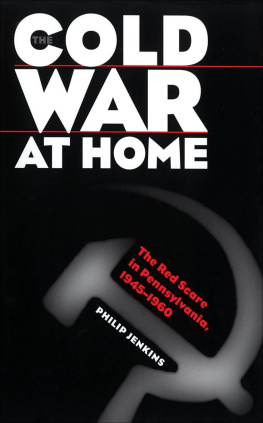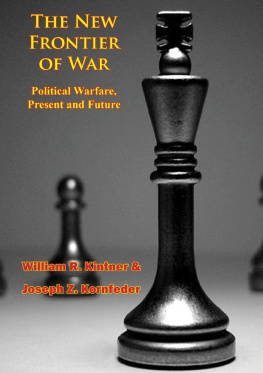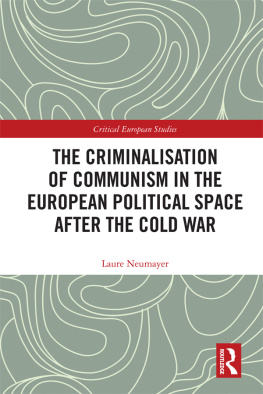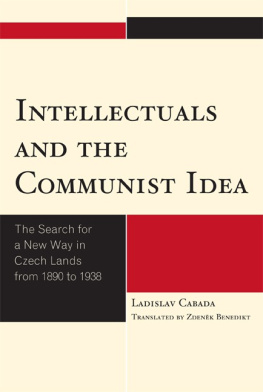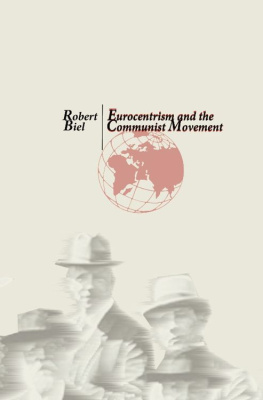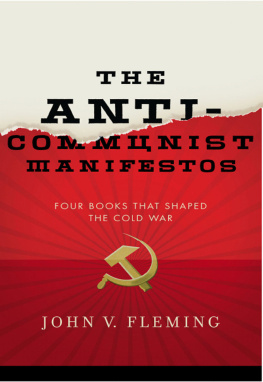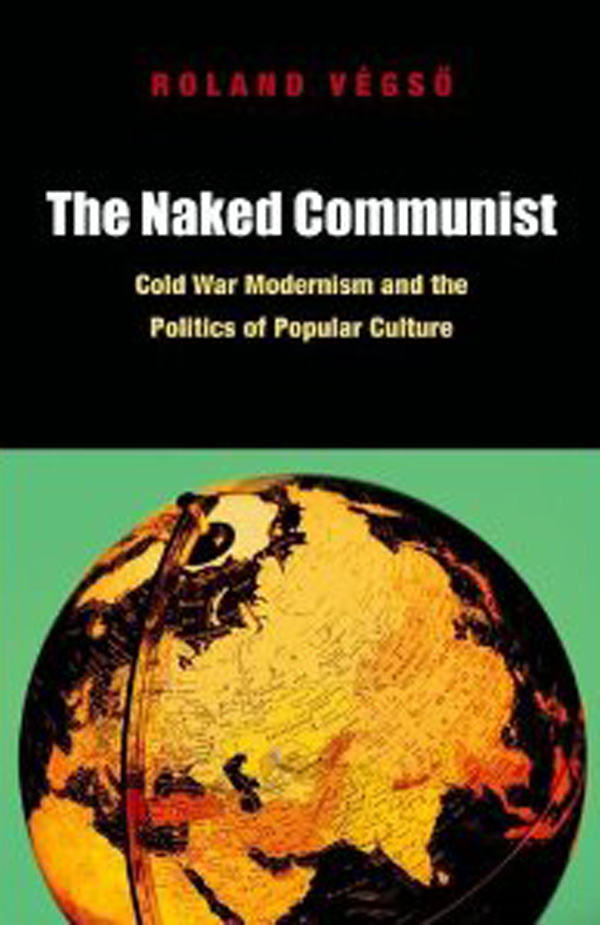The Naked Communist
Cold War Modernism and the Politics of Popular Culture
Roland Vgs
Fordham University Press
New York 2013
Copyright 2013 Fordham University Press
All rights reserved. No part of this publication may be reproduced, stored in a retrieval system, or transmitted in any form or by any meanselectronic, mechanical, photocopy, recording, or any otherexcept for brief quotations in printed reviews, without the prior permission of the publisher.
Fordham University Press has no responsibility for the persistence or accuracy of URLs for external or third-party Internet websites referred to in this publication and does not guarantee that any content on such websites is, or will remain, accurate or appropriate.
Fordham University Press also publishes its books in a variety of electronic formats. Some content that appears in print may not be available in electronic books.
Library of Congress Cataloging-in-Publication Data
Vgs, Roland.
The naked communist : Cold War modernism and the politics of popular culture / Roland Vgs. First edition.
pages cm
Includes bibliographical references and index.
ISBN 978-0-8232-4556-7 (cloth : alkaline paper)
ISBN 978-0-8232-4557-4 (paper : alkaline paper)
1. Anti-communist movementsUnited StatesHistory20th century. 2. Anti-communist movementsUnited StatesPhilosophy. 3. Cold WarPolitical aspectsUnited States. 4. Popular culturePolitical aspectsUnited StatesHistory20th century. 5. AestheticsPolitical aspectsUnited StatesHistory20th century. 6. United StatesPolitics and government19451989. 7. Anti-communist movements in literature. 8. Cold War in literature. 9. American literature20th centuryHistory and criticism. 10. United StatesIntellectual life20th century. I. Title.
E743.5.V44 2013
973.91dc23 2012027146
First edition
A book in the American Literatures Initiative (ALI), a collaborative publishing project of NYU Press, Fordham University Press, Rutgers University Press, Temple University Press, and the University of Virginia Press. The Initiative is supported by The Andrew W. Mellon Foundation. For more information, please visit www.americanliteratures.org.
To the memory of my father, Dr. Kroly Vgs (19402010)
Contents
I would like to start by thanking my mentors at the English and Comparative Literature Departments of the State University of New York at Buffalo for their unfailing guidance and inspiring friendship: Joan Copjec, Ernesto Laclau, David Schmid, Tim Dean, and Rodolphe Gasch. At the same time, I would like to acknowledge the direct and indirect contributions of all of my friends and foes at UBs Center for the Study of Psychoanalysis and Culture. You know who you are. Furthermore, I am also indebted to the two readers of the manuscript, Donald E. Pease and Michael Tratner, for their helpful comments and friendly criticisms. Needless to say, I am also grateful for the support of my colleagues at the English Department of the University of Nebraska-Lincoln. Special thanks are due to Sorin Radu Cucu and Marco Abel for their friendship. In the end, all this would have been impossible without Emily Hammerl.
Parts of Chapter 7 have been published previously as The Importance of Being Ugly: Anti-Communist Anti-Imperialism in Comparative American Studies 6.4 (December 2008): 374387.
Those familiar with the history of American anti-Communism will immediately recognize that I borrow my title from Cleon W. Skousens The Naked Communist (1958). The title refers to the naked truth itself, which is expected to come about as the result of a successful critique of ideological mystifications and which offers pure presentation in place of deceitful representations.
But when I quote Skousens title, I intend to repeat it with a significant difference. As Skousens own career shows, the first revelation of truth leaves something to be desired. In 1970, he authored the companion piece to The Naked Communist under the title The Naked Capitalist, in which he argued (in the form of an extended review of Carroll Quigleys Tragedy and Hope) that the Communist conspiracy was a mere tool in the hands of an even bigger conspiracy run by rich capitalists. Of course, this shift from the Communist conspiracy to something resembling contemporary theories of the New World Order might appear to be a historically predictable move. But we could also interpret the naked capitalist as the answer to the inherent ambiguity of the naked Communist, since it replaces an unstable earlier version of the truth with a new kind of certitude.
Thus, the irony of Skousens title is that it presents an unstable figure of ideological demystification which leads to secondary acts of demystification. From the perspective of the second book, the nakedness of the Communist does not refer to the direct revelation of truth but to yet another seductive illusion that was first mistaken for a truth. The inherent danger of such demystifications is that they threaten to open up an infinite series of further demystifications. Hence the necessarily double figure of the naked Communist: it is simultaneously an object of knowledge and an object of desire. As an object of knowledge, it functions as the central figure of a potentially infinite discursive machine whose objective is the dissemination of anti-Communist knowledge. As an object of desire, however, it functions as an agent of seduction. It puts an end to the potential infinity of demystifications by introducing the possibility of truth into the domain of mere knowledge. This distance separating The Naked Communist from the The Naked Capitalist provides us with a first definition of ideological truth: truth occurs when a desire for truth interrupts a potentially endless series of demystifications.
Unlike Skousens title, therefore, mine intends to evoke both of these meanings as it tries to call attention to the internal dialectic of ideological knowledge. But I evoke here the figure of the naked Communist as one possible historical manifestation of a general problem of modernity. My argument is based on the assumption that the political ideologies of modernity were determined in a fundamental manner by four basic figures: the world, the enemy, the secret, and the catastrophe. Whereas the world names the totality that functioned as the ultimate horizon of modern politics, the three other figures define the necessary limits of this totality. The naked Communist is an easily recognizable figure of this enemy whose identity was determined in a fundamental manner by the secrecy that was associated with it and the global catastrophe that it threatened to bring upon us.
Although these four figures have formed a number of different historical constellations, I try to highlight their enduring presence in the modern imagination through the detailed analysis of one concrete historical example: American anti-Communist politics of the 1950s. Within this historical context, my primary objective is to describe the internal mechanisms of what we could call an anti-Communist aesthetic ideology. By aesthetic ideology, I mean a specifically modern invention that names the complex relation between art and politics in our age. This is why I argue that in order to understand the politics of literary modernism in the United States, we have to analyze the terms of its institutionalization during the 1950s by the discourse of Cold War liberalism. In this liberal discourse, however, anti-Communist popular culture emerged as a political symptom of modernism for two reasons: on the level of politics, Cold War liberalism strove to define itself as the opposite of conservative anti-Communism; on the level of aesthetics, its fundamental gesture was the rejection of mass culture in the name of modernism. It is in this sense that I call anti-Communist popular culture the ideological other of modernism.

